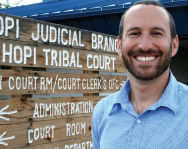Arguing with Tradition

To most people, the case in front of Justin Richland '92 would seem typical enough: a married couple was getting divorced and had a property dispute.
But this was no typical court.
That's because Richland was an appellate judge for the Hopi Native American tribe in Arizona, a group to which he has devoted his career. While American courts might advocate a 50-50 split in divorce proceedings, Hopi tradition says that a man builds a house, but a woman owns it.
"In divorce proceedings, men say 'you can have that home I built, but I want just compensation for half the value,'" Richland said. "That makes no sense from a Hopi perspective."
A chance encounter during his student days at UCLA law school led Richland to a career working with the Hopi and other Native American tribes. He is co-founder of a nonprofit group, Nakwatsvewat Institute (a Hopi term meaning "moving forward in a friendly way"), that helps to settle court disputes while upholding tribal traditions, some of which don't mix easily with the laws.
"We believe the Hopi people have both the ability and the right to resolve these disputes on their own terms, as a sovereign nation and as a community that is still around and still viable," said Richland. "We take the tack that the Hopis, in this strange mix of traditional and nontraditional, can find a way to come to a middle ground."
According to Hopi tradition, for instance, tribe members are entitled to land only when they fulfill responsibilities in yearly ceremonial rituals. This requirement invariably leads to disputes when tribe members come back to the reservation and seek land. More than half the eleven thousand members of the tribe currently live off the reservation.
Richland's organization attempts to keep these kinds of disputes out of the courts, seeking mediation that satisfies both the tribal traditions and legal mandates.
"It's often tragic, because these are people who are coming back because they want to be part of the community now," Richland said. "We assist these communities in finding more efficient ways to negotiate their duties and responsibilities to each other and to the land they share."
Richland, now an associate professor in the School of Social Ecology at the University of California, Irvine, has worked with the Hopi and more than thirty other tribes through his nonprofit group. He also served a four-year term on the Hopi appellate court from 2005 to 2009.
Originally from California, Richland traces his interest in the Hopi back to his Kenyon anthropology major. As an undergraduate, he was most interested in language practices and rhetoric, examining the relationship between culture, language, and stories in various societies.
In particular, Richland was inspired by "Trickster Mythology," a class cross-listed in anthropology and taught by English professor Lewis Hyde. "It ended up being a fantastic class," Richland said. "It really got me thinking about ways in which norms and values in stories work to shape people's lives. That has been an underlying theme in my work."
Now, Richland sees his work as applying lessons he learned from Hyde in the way his organization works to keep people out of the courtroom, even if they can't solve a dispute. In bringing feuding parties face to face so they can try to talk out their differences, he seeks to break the disputants out of the normal courtroom context-and help them avoid lawyers' fees they can't afford.
Richland became Hyde's research assistant after taking his class, but he had yet to find his calling. Lacking better options, he enrolled in law school at UCLA.
In law school, Richland learned about the tribe from a Hopi classmate, who told him about an internship clerking for the tribal appellate court-the same court on which he would later serve. The two made plans to start a nonprofit to help the Hopi settle legal disputes, but a lack of funding scuttled their initial plans to launch.
Meanwhile, Richland earned a Ph.D. in anthropology from UCLA, focusing his dissertation on the Hopi tribe. Eventually the nonprofit successfully got off the ground, and it remains vibrant today.
Richland has never been paid by the Hopi, and he jokes that, having turned down a job offer after law school, "I'm still not making as much money as the law firm offered back then."
But that's of little concern, as Richland's career gives him the opportunity he sought to explore both law and anthropology. He is the author of a book about the Hopi tribe, Arguing with Tradition: The Language of Law in Hopi Tribal Court, and of a textbook, Introduction to Tribal Legal Studies.
"I didn't want a typical career in law," Richland said.
-Jeremy Herb

 Delicious
Delicious Facebook
Facebook StumbleUpon
StumbleUpon Digg
Digg reddit
reddit